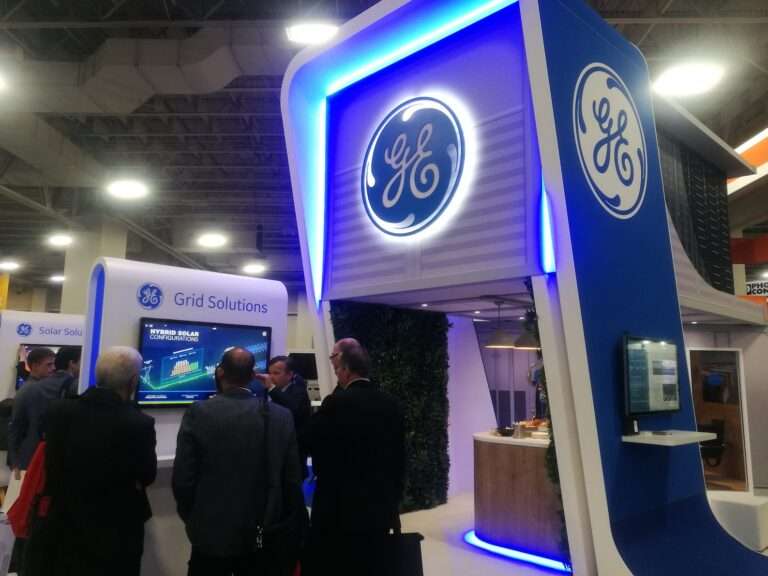
Responding to increasing demand for dispatchable renewable energy resources, GE Renewable Energy has opened a factory for ‘Renewable Hybrid’ technology solutions and equipment in Chennai, India.
It will manufacture the company’s containerised inverter solution, FLEXINVERTER, which is claimed to be a plug and play unit suitable for solar and energy storage applications at utility-scale, and FLEXRESERVOIR, an integrated battery energy storage and power electronics solution which can be flexibly configured to deliver multiple market applications.
Both products will also be integrated into GE Renewable Energy’s new digital platform, FLEXIQ, which enables customers to design projects, operate them and manage them at fleet level. The company claimed FLEXIQ enables grid compliance as well as maximising customer lifetime value.
Apparently the factory employs 250 workers, which was the only indication given by GE Renewable Energy of its size and production capacity. Energy-Storage.news has asked for further details on those metrics, as well as on any plans to ramp up production in response to customer demand, but had yet to receive a reply at the time of publication.
“As the industry and customers’ demand dispatchable renewable energy to navigate the energy transition, the need for hybrid systems is increasing exponentially,” Prakash Chandra, CEO for Renewable Hybrids at GE Renewable Energy said as the factory’s opening was announced yesterday.
FLEXRESERVOIR is scalable from a rated power of 3MW to 500+MW with the addition of more inverters, with durations of less than an hour to more than four hours with the addition of more battery storage units.
FLEXINVERTER is available as a solar PV inverter, or for use with battery energy storage systems (BESS), with DC and AC coupling configuration options and advanced grid features and reactive power control.
The FLEXIQ plant control platform provides integration for standalone solar PV, PV-plus-BESS and PV-plus-wind-plus-BESS configurations, accommodating AC and DC coupling as well as standalone configurations. It can manage voltage, power factor and reactive power capabilities, and incorporates PV signals into the SCADA at overall plant level.
GE Renewable Energy said the new factory will be able to full produce and integrate systems on site. It is in a central location with national highway connections, as well as accessibility to air and sea transport routes, the company said.
In a recent report into India’s lithium-ion battery manufacturing space, issued by research group JMK Research and Analytics with the international Institute for Energy Economics and Financial Analysis (IEEFA), it was pointed out that renewable energy sector-driven demand for battery storage is expected to grow significantly in the country.
While 90% of battery demand will be driven by the automotive sector, grid-scale energy storage will be needed, not least of all to help integrate the 450GW of renewable energy resources the government aims to have online in India by 2030.
The country already has fairly well established domestically-located battery pack manufacturing facilities, but is yet to move forward on large capacity additions of battery cell production, the report said. The Union government is looking to support advanced chemistry cell manufacturing with incentives for up to 50GWh of production facilities from foreign or Indian companies building factories in the country.
According to JMK and IEEFA, a large market for grid-scale battery storage in India is “still a few years away,” largely due to the relatively high cost. As of last March the country only had about 30MW of solar that was paired with just under 20MWh of battery storage at grid-scale but the ongoing addition of renewable energy capacity will drive demand for projects supported by BESS to firm up that power output.
“With the need for an assured renewable energy-integrated power supply bound to grow significantly in the future, lithium-based BESS will become critical in this (grid-scale renewable energy integration) market segment,” the report said.
In the country’s most recent Union Budget, announced last week, energy storage systems became eligible for classification as infrastructure, opening up pathways for loans and investment financing in a move warmly welcomed by the industry. This followed the Ministry of Power issuing a clarification of the status of energy storage systems in India’s power sector, describing the technologies as “essential” to achieving renewable energy aims.
International energy storage tech provider Fluence has said it will launch a joint venture to take on the Indian market with one of its biggest players in renewable energy, ReNew Power, later this year.
Source : Energy Storage News

